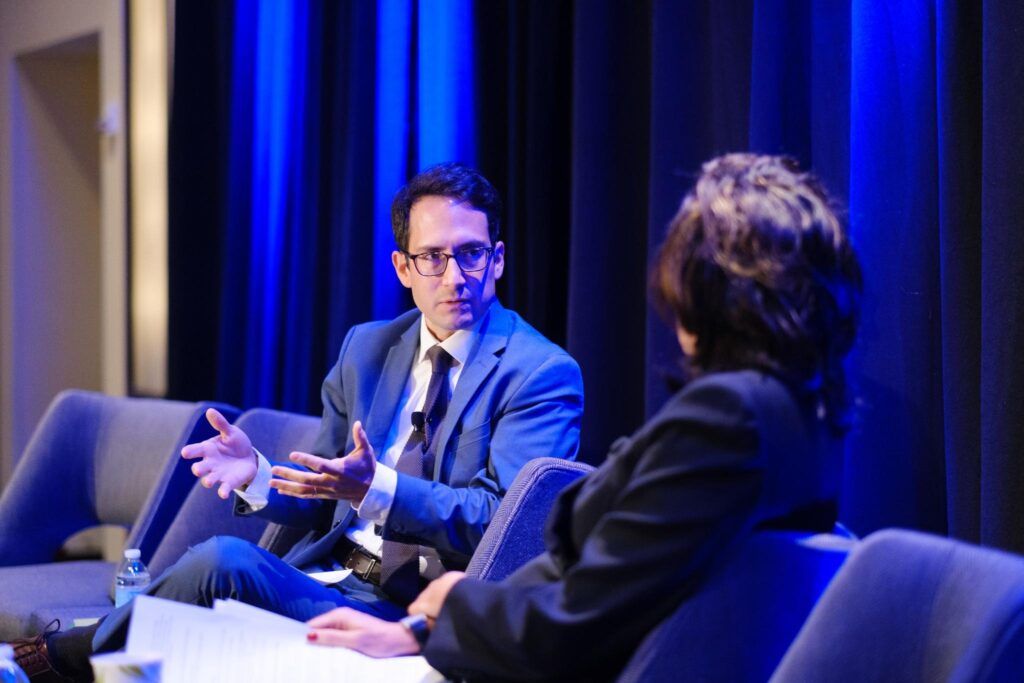The AI Supply Chain: An Emerging Oligopoly?
Prithvi Iyer / Nov 21, 2023Prithvi Iyer is Program Manager at Tech Policy Press.

This weekend’s news that Microsoft may have effectively “acquired” Open AI, as two of the startup’s key executives joined the company following a board coup that ousted Open AI CEO Sam Altman, brought the high stakes Silicon Valley battle for dominance in artificial intelligence to the top of news feeds. Microsoft CEO Satya Nadella had already bound Open AI to Microsoft’s enterprise computing infrastructure, making the $80 billion startup in many ways dependent on the nearly $3 trillion behemoth founded by Bill Gates and Paul Allen in 1975. To many observers, Nadella’s move to take advantage of Open AI’s crisis appears to be a master stroke.
No matter how things ultimately turn out, this saga underscores the degree to which AI is dominated by big tech firms with massive resources, both computational and financial. The scale of firms such as Microsoft, Google, Amazon, and Meta puts them in a strategic position that allows them to set the rules of the game.
This reality is explored in a new report from the Open Markets Institute and the Center for Journalism and Liberty at Open Markets that “shows how just a handful of Big Tech companies – by exploiting existing monopoly power and aggressively co-opting other actors – have already positioned themselves to control the future of artificial intelligence and magnify many of the worst problems of the digital age.” The authors of the report – the institute’s Barry Lynn, Max von Thun, and Karina Montoya – propose a deeper examination of the “already existing powers, structures, and behaviors of the corporations that control the foundational technologies and capacities underpinning AI.”
The report was published ahead of a November 15 event hosted by the Open Markets Institute and the AI Now Institute Washington, DC. In a keynote discussion at the event, Federal Trade Commissioner Alvaro Bedoya addressed concerns over market concentration and AI, noting that big technology companies have engaged in a vertical integration wherein they own or control the overwhelming majority of resources necessary to dominate, from semiconductors to cloud computing infrastructure, foundation models, and the user interface.
“If you have a foundation model, you need data and compute feeding into that model. And then you need platforms and user interfaces that people can interact with,” said Commissioner Bedoya. “And I'm sure every single person in the room can think about which market actors would then have these foundation models, have that data, have that compute and have those user interfaces.”
The Open Markets Institute report provides some data that demonstrates this vertical integration in practice. The authors found that Google, Amazon and Microsoft “control over two-thirds of the $600 billion (measured in annual revenue) global cloud market, ensuring these corporations have access to computing capabilities and storage capacity which no other actors enjoy.” It is especially worrying when these same companies invest significantly in foundation model development (like Microsoft’s investment in Open AI) because it creates an environment where these companies can engage in preferential treatment for their own services.
Even with the chips that power the cloud computing resources needed to develop AI models, monopolies seem to be emerging. The report notes that Nvidia now enjoys a “near monopoly designing chips used to train large-scale AI models.” These chips are in turn manufactured by the Taiwan Semiconductor Manufacturing Company (TSMC), which enjoys 90% market share, even as Amazon, Google and Meta are also developing in-house capabilities for chip manufacturing to spearhead their AI ambitions.
In an afternoon discussion at the November 15, event, Doha Mekki, Principal Deputy Attorney General in the Antitrust Division at the Department of Justice, shared her perspective on the prospect of using antitrust law to tackle the emerging oligopoly in AI. Echoing Commissioner Bedoya’s concerns about vertical integration in the AI market, Mekki said that certain companies – particularly those with a stronghold in areas like internet search and cloud computing – may be leveraging existing monopoly power when venturing into AI technologies. She said it’s necessary to take a fresh perspective on potential harms from such concentration.
“If you are trapped in a paradigm that views competition as the type of competition that made sense in smokestack industries, you are likely to miss some of the real harms that are attendant to platform industries or to certain kinds of labor markets where we know that at lower power thresholds, you can start to see real harms that the antitrust laws are supposed to affect,” said Mekki.
That being said, the Principal Deputy AG was confident antitrust tools can be useful to address AI, and urged people in the room to not settle for monopolies she deemed to be the “autocrats of trade,” borrowing a phrase from from Senator John Sherman, for whom the first US antitrust law is named.
The report from Open Markets Institute offered some concrete policy solutions to address the AI oligopoly and its anti-competitive practices. These included:
- To recognize that data gathered by big technology companies should be deemed as essential services and a public interest regime should be instituted to govern data access.
- Blocking future mergers and acquisitions that further solidify big tech giants as “gatekeepers” in AI.
- Recognize cloud computing as an essential infrastructure and prevent the same company from being able to control cloud computing and its downstream applications. Moreover, the report also recommends regulating cloud computing as a public utility.
For these recommendations to be implemented, policymakers must be willing to look beyond the AI hype and deal with emerging monopolies in the AI supply chain. The first step towards addressing these concerns is a willingness to learn about the corporate relationships underlying AI development. Commissioner Bedoya indicated that is where his attention is invested at the moment.
“I certainly am trying to get a sense of the leading models, how they work, what goes into them in terms of data, what goes into them in terms of compute, the commercial relationships between the companies behind the models and the companies behind the compute, behind the data, behind the interfaces,” he said. “That is absolutely of acute interest.”
Authors
